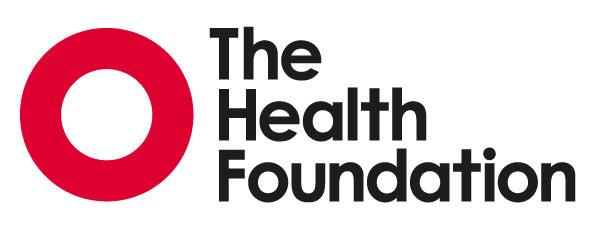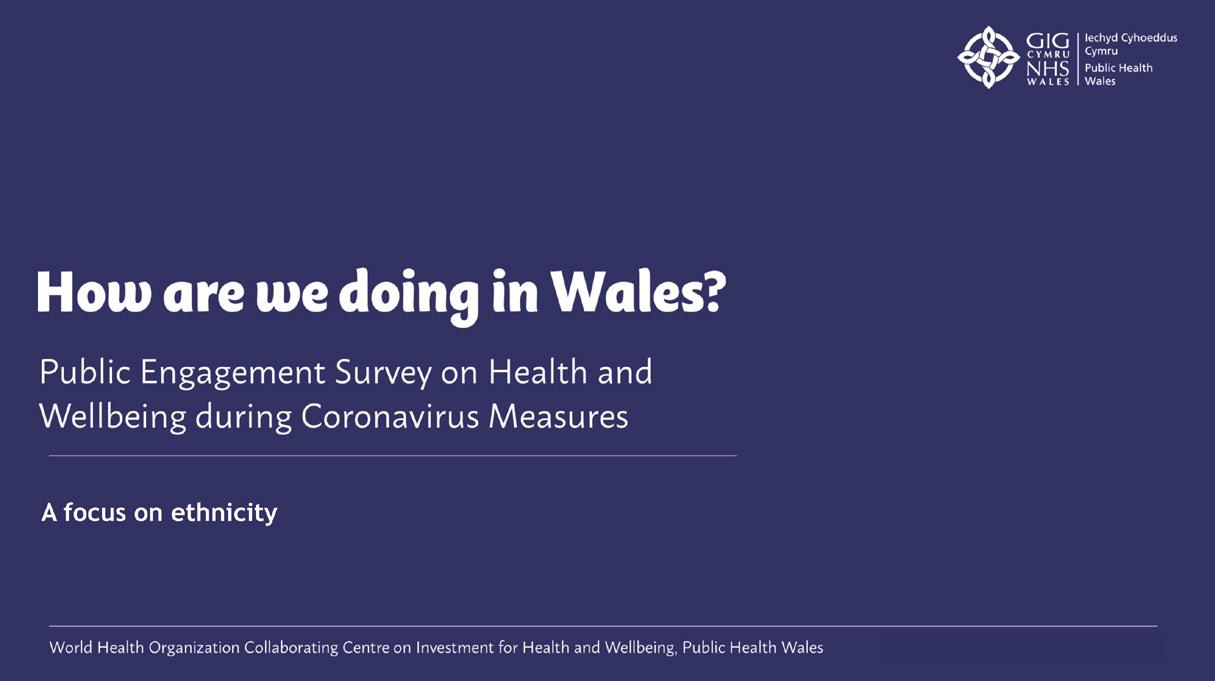
7 minute read
Headlines
Building social capital whilst social distancing
Since May 2019, the ‘Community Assets, Participation & Integration: Taking Action Locally’ (CAPITAL) project has looked at building social capital as a determinant of health & well-being, through bringing together and empowering groups perceived as socalled ‘vulnerable’ or ‘socially excluded’ within the community. The project is part of the Health Foundation’s ‘Taking action on the social determinants of health’ programme and is managed by Public Health Wales in partnership with Tai Pawb and the Wales Strategic Migration Partnership. The project tests the impact of inclusive coproduction at a neighbourhood level in Morriston, Swansea, working with primarily social housing tenants and people seeking sanctuary (asylum seekers and refugees).
Many of the wider determinants of health for people seeking sanctuary are controlled by non-devolved immigration policy, restricting action at a local (Wales) level. People seeking sanctuary commonly report the asylum process itself as being detrimental to their health and well-being, particularly mental health (Mind Cymru, 2017). Evidence indicates that both social housing tenants and people seeking sanctuary are more commonly isolated, more likely to suffer from mental ill health and experience economic hardship than other groups of people. These inequities are likely to have been exacerbated by the COVID-19 pandemic. However, investing in social capital and integration makes it easier for people to access services, reduces educational and health inequalities, helps them to find jobs and, fundamentally, underpins social cohesion and community empowerment (Smith, 2015). people seeking sanctuary and non-sanctuary seeking social housing tenants, who were meeting regularly and working together. Through facilitated sessions, this ‘Action Group’ had looked at different issues and challenges in Morriston, and agreed ideas to collectively use their assets to develop an asset-based community development project to address these.
The lockdown measures risked the sustainability of the project, and the well-being of its participants. The impact of lockdown on social capital was set to be enormous, especially for people with low levels of social capital in the first place. Additionally, the lockdown measures risked further entrenching exclusion of ‘need to reach’ groups from decisionmaking processes. Following a short break in the early stages of the lockdown, the project therefore adapted quickly to the context of the pandemic to ensure that momentum behind the project, and the benefit to its participants, was not lost. Key actions taken were:
• Providing mobile data packs for all participants to ensure they could stay connected with the project through virtual meetings on Zoom. • Partnership working to provide the necessary support to the Action Group even while public health resources were mobilised to the COVID-19 health protection response. • Focusing on what can be done virtually and
‘parking’ other project ideas for a later date. • Widening the definition of participation and involvement beyond attending meetings; participants have shared ideas, participated and communicated on the group’s
WhatsApp platform.
While COVID-19 has hampered physical connections, it has presented the opportunity to increase communication via different online avenues provided barriers to digital inclusion are addressed. The Action Group have produced six community newsletters during the pandemic, which have focused on sharing activities to promote well-being that can be done at home. The group have engaged with key local stakeholders such as presenting at the Morriston Regeneration Forum, a partnership group working together to support the economic regeneration of Morriston. The CAPITAL approach has empowered the Action
Group to form its own identity of the ‘We Love Morriston’ project to work collaboratively with Public Health Wales and our project partners, and embed sustainability beyond the life of the CAPITAL project. Adapting the inclusive coproduction approach, even in the most difficult circumstances of the pandemic, has resulted in these practical outputs driven by participants.
In addition, evaluation shows that the level of social capital within the Action Group increased as a result of the CAPITAL project. Six out of seven participants reported feeling closer to others in the group. Reasons described include spending time together, whether physically or online, and building an idea together. All participants rated their connectedness to their local community more highly at the end of the project, with all seven scoring five or above out of seven at the end point, compared with 85% scoring four or below at the baseline. Finally, all seven participants who took part in the final questionnaire said they feel better supported to create social links because of their involvement in the CAPITAL project. The sample size is too small for statistical analysis but the shift in the data strongly indicates a positive change.
Inclusive coproduction builds relationships between different groups in the community and facilitates integration for newcomers, regardless of their background or nationality. People are the experts of the needs in their communities, know how to best address issues that affect them and find solutions. Inclusive coproduction therefore has the power to develop responsive services suited to the needs of diverse communities, but in the process, also has potential to build social capital, in itself a determinant of health and well-being. The CAPITAL project has shown that even in the context of social distancing, this approach builds social capital.
Further resources from the CAPITAL project will be available in January, including a ‘Roadmap to Inclusive Coproduction’. Please contact Stepheni Kays, Community Development Researcher, at Stepheni.Kays@wales.nhs.uk for more information.


As part of the All Wales BAME Engagement Programme, Ethnic Minorities and Youth Support Team Wales (EYST Wales) has been working on mapping the breadth and diversity of BAME organisations in Wales.
BAME organisations have been defined as any community group or organisation which is run predominantly for or by people of Black, Asian or Minority Ethnic backgrounds.
Please click here for further information.
Towards the end of 2020 PHNC held the following two webinars:
Latest webinars from Public Health Network Cymru
COVID-19 and BAME Communities – The Welsh Government Response
The webinar was delivered by Dr Heather Payne, Senior Medical Officer, Maternal and Child Health, Welsh Government.
The session described the work of the First Ministers Advisory Group on health inequalities due to COVID-19 in Black Asian Minority Ethnic (BAME) communities and the Welsh Government response.
The Unequal Pandemic: COVID-19 and Health Inequalities
The webinar was delivered by Clare Bambra, Professor of Public Health, Faculty of Medical Sciences, Newcastle University.
The webinar examined the implications of the COVID-19 pandemic for health inequalities. It outlined historical and contemporary evidence of inequalities in pandemics - drawing on international research into the Spanish flu pandemic of 1918, the H1N1 outbreak of 2009, and the emerging international estimates of socio-economic, ethnic and geographical inequalities in COVID-19 infection and mortality rates. It then examined how those inequalities in COVID-19 were related to existing inequalities in chronic diseases and the social determinants of health, argued that we were experiencing a syndemic pandemic.
It then explored the potential consequences for health inequalities of the measures implemented internationally as a response to the COVID-19 pandemic, and focussed on the likely unequal health impacts of the economic crisis. The talk concluded by reflecting on the longer term public health policy responses needed to ensure that the COVID-19 pandemic did not increase health inequalities for future generations.
The live recordings of both webinars along with other webinars held in 2020 are available to view on the PHNC website.
New BAME Helpline launched in Wales to respond to Covid-19 Network Cymru
BAME communities have been disproportionately impacted by Covid-19 and need specialist advice and support. Wales TUC are proud to be involved in a brand new national multi-lingual helpline which will respond to this demand.
The helpline is available from Monday to Friday 10.30 – 2.30. The helpline will provide an accessible first port of call for information on a range of specialist, mainstream and community organisations, with call handlers speaking a range of community languages.
Those looking for help on a number of issues such as; employment & welfare, education, housing, personal safety and health issues can be referred or signposted to a range of mainstream and community organisations for further advice and support.
How are we doing in Wales?
Public Engagement Survey on Health and Wellbeing during Coronavirus Measures: A focus on ethnicity
Findings suggest that coronavirus and the lockdown restrictions are currently having a greater impact on the mental health and wellbeing of Black, Asian and minority ethnic (BAME) residents in Wales. A third of BAME respondents report feeling isolated and 1 in 5 are worrying a lot about their finances. However, BAME respondents are also engaging in more prayer and mindfulness activities, which may offer a positive means of coping with current stressors.

Welsh Government works with BAME community partners to address racial inequality in Wales
The Welsh Government has awarded 25 grants totalling £115,580 to community groups across Wales to help put Black, Asian and Minority Ethnic (BAME) voices at the heart of the development of Wales’ Race Equality Action Plan.





